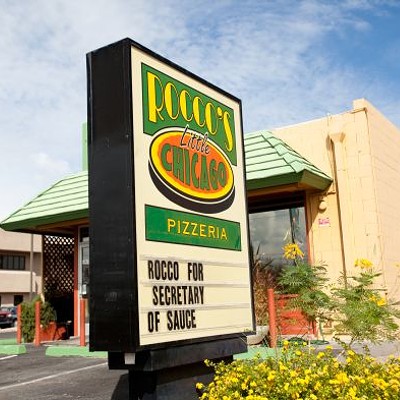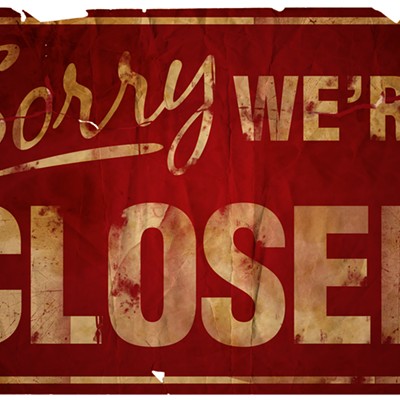In fact, Tucson's nervy, natural gas behemoth is tapping your hard-earned cash to feed you back a bowl o' blather. As in political, pro-industry propaganda.
It happened recently when Southwest sent its customers a chatty little broadside called News to Use. Colorful and slick, this communiqué seems innocuous enough--until you read between the lines. And we quote:
Q. The current price of natural gas has doubled from about a year ago. Why is that?
A. There are several reasons for this increase. Natural gas production has not kept pace with the rising demand. There are ample quantities of untouched natural gas resources in the United States and Canada. Unfortunately, the lack of a national energy policy in the U.S. has been detrimental to promoting more exploration.
Now, this drill-and-bill approach to energy independence might tickle the Bush-leaguers. But it got under the skin of Scotty Dean, a budget manager at Tucson Medical Center. Not surprisingly--and to Southwest's utter misfortune--Dean is one of those folks who can spot numerical shenanigans a mile away. And he just hates getting bull with his gas bill.
"I didn't think the message they were sending was very subtle," he says.
Adding insult, Dean's number-crunching skills and his stash of old bills proved that Southwest was playing loose with the truth. "I'm a paper packrat," he says, "and I got curious when they talked about gas prices doubling in the last year. I didn't seem to recall that with my bills."
Closer examination revealed that, rather than doubling, his bills "were down from a year ago. And I thought, what's up with that?"
In fact, Dean's monthly costs had dropped by 9 percent during the past year. But that hardly fit into the newsletter's pro-drilling thrust. "They say, 'Let's go ahead and do more gas exploration--that's why our costs are up, because we're not exploring,'" Dean says. "It's pretty obvious what their agenda is. That kind of thing really disturbs me, when it's supposedly from a factual source, and therefore supposedly factual data. But that's not the case at all."
So what gives?
"When we say that prices are double what they were a year ago, we're talking about the commodity market, not the rates that we're passing on to customers," says Libby Howell, a Southwest spokeswoman. "In that newsletter, we're talking about the wholesale natural gas market."
Strangely, the terms "commodity market" or "wholesale natural gas market" don't appear a single time in the letter. Instead, readers are led to believe that their gas costs have doubled, and that increased drilling, often in environmentally sensitive areas, is the only solution.
And what about the fact that Scotty Dean's bill actually dropped--rather than doubled--during that period? Well, Southwest has a number of long-term contracts with suppliers and pipelines to get the gas to Tucson, Howell says. "Our price is logged in well into the spring. So this winter, our customers will be somewhat protected, because the price they're paying reflects those long-term contracts.
"Maybe we didn't do as good a job at making that clear as we could have in that newsletter," she says.
Boy-howdy.
OK, now we've learned that the Southwest Gas newsletter is actually referring to national gas prices, as opposed to what its own customers are really paying. Still, it can't be ignored that gas prices have spiked nationally. The reason? Not enough drilling, says Howell.
And what about the newsletter's assertion that lack of a national energy policy has been detrimental to promoting more exploration--a sentiment that might have been penned by Dick Cheney himself?
"It means two things," Howell says. "It means that in the past, there have perhaps been no incentives to those drillers to seek inexpensive ways to get natural gas out of the ground. And so many areas are restricted, in terms of where you can drill. I mean, the Arctic National Wildlife Refuge in Alaska is a good example of that."
Does that clear things up? Sure--at least for Southwest Gas. "The natural gas industry believes that there are ways to drill for that gas that will not damage the environment," she says. "Restricting the availability of natural gas will ultimately drive the cost up. I think it's appropriate for the company to make people aware of that."
This leaves one final question, which the Tucson Weekly put to Mark Cooper, director of research for the Washington, D.C.-based Consumer Federation of America: Is it ethical for Southwest Gas to massage the message to promote more drilling?
"If the ratepayer pays for the newsletter (as in this case), then the alternative point of view ought to have an equal opportunity," he says.
Southwest has sent out "a piece of political mail in the form of a newsletter, a classic political message. They leave stuff out; they don't explain; and they try to create support for a point of view. And if they've done that on the ratepayers' nickel," Cooper says, "that's conflict of interest."
Besides, it's downright rude, says Scotty Dean. "That's part of my frustration with Southwest Gas. I'm stuck paying for this nice glossy puff piece."












